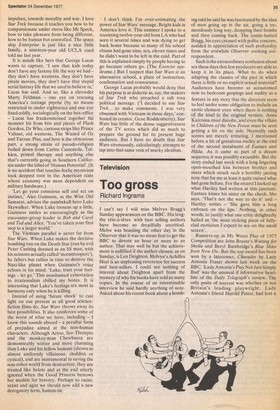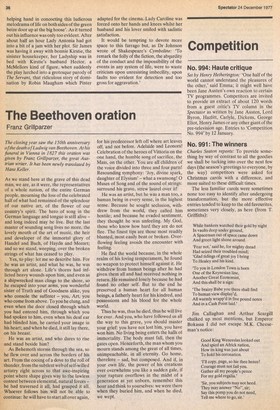Television
Too gross
Richard ingrams
I can't say 1 will miss Melvyn Bragg's Sunday appearances on the BBC. His lengthy tête-à-têtes with best selling authors have become so dreadfully uncritical. Melve was boasting the other day in the Observer that it was no mean feat to get the BBC to devote an hour or more to an author. That may well be but the achievement is nullified if the author chosen, as on Sunday, is Len Deighton. Melvyn's Achilles Heel is an unpleasing reverence for success and best-sellers. 1 could see nothing of interest about Deighton apart from the mystery of why his books have sold so many copies. In the course of an interminable isiterview he said hardly anything of note. Asked about his recent book about a bomb ing raid he said he was fascinated by the idea of men going up in the air, going a tremendously long way, dropping their bombs and then coming back. The tousle-haired Bragg, his eyes creased with polite concern, nodded in appreciation of such profundity from the erstwhile Observer cooking correspondent.
Such is the extraordinary confusion about sex these days that few producers are able to keep it in its place. What to do when adapting the classics of the past in which there is little or no explicit sexual material? Audiences have become so accustomed now to bedroom gropings and nudity as a feature in any story that the directors seem to feel under some obligation to include an erotic element even when there is nothing of the kind in the original version. Anna Karcnina must disrobe, and even the villain in Children of the New Forest must be seen getting a bit on the side. Normally such scenes are merely irritating. I mentioned before a bit of gratuitous nudity at the end of the second instalment of Eustace and Hilda. As it came as part of a dream sequence it was possibly excusable. But the story ended last week with a long lingering open-mouthed kiss between brother and sister which struck such a horribly jarring note that for me at least it quite ruined what had gone before. For the record I looked up what Hartley had written at this juncture. Eustace kisses his sister on the cheek. She says, 'That's not the way to do it' and — Hartley writes — 'She gave him a long embrace on the lips.' Nothing, in other words, to justify what one critic delightedly hailed as 'the most striking piece of fullyclad eroticism I expect to see on the small screen', Runners-up in My Worst Play of 1977 Competition are John Braine's Waiting for Sheila and Beryl Bainbridge's Blue Skies from Now On. But the top award has been won by a latecomer, Charades by Lady Antonia Fraser shown last week on the BBC. 'Lady Antonia's Play Not Just Simply Bad' was the unusual if informative headline of the Daily Telegraph's review. The only point of interest was whether or not Britain's leading playwright, Lady Antonia's friend Harold Pinter, had lent a helping hand in concocting this ludicrous melodrama of life on both sides of the green beize door up at the big hoose'. As it turned out his influence was only too evident. After about half an hour Lady Antonia had got into a bit of a jam with her plot. Sir James was having it away with bonnie Kirstie, the sinister housekeeper, her Ladyship was in bed with Kirstie's husband Hector, a McMellors kind of figure, when suddenly the play lurched into a grotesque parody of The Servant, that ridiculous story of domination by Robin Maugham which Pinter adapted for the cinema.. Lady Caroline was forced onto her hands and knees whilst her husband and his lover smiled with sadistic satisfaction.
It would be tempting to devote more space to this farrago but, as Dr Johnson wrote of Shakespeare's Cymbeline: "I'o remark the folly of the fiction, the absurdity of the conduct and the impossibility of the events in any system of life, were to waste criticism upon unresisting imbecility, upon faults too evident for detection and too gross for aggravation.'











































 Previous page
Previous page